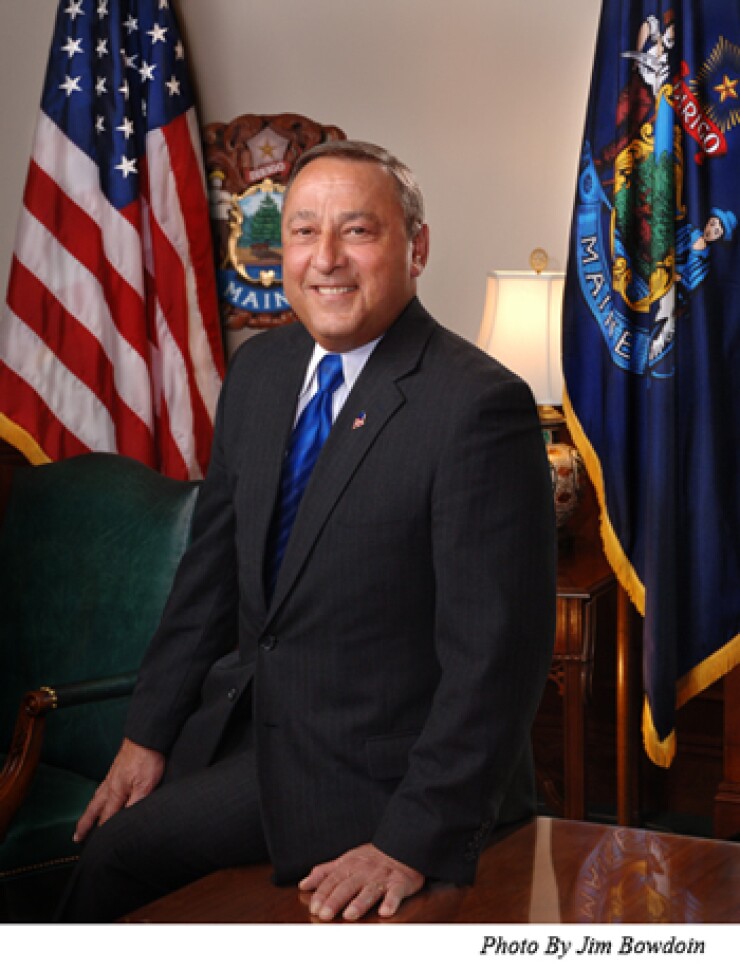Want unlimited access to top ideas and insights?
State legislators in Maine overwhelmingly rejected a veto from Gov. Paul LePage against an update to the state’s credit union charter that would more closely align it with the federal charter.
On Thursday, the Maine House voted 141-5 to override LePage’s veto of L.D. 1055, following the state Senate’s unanimous move to override it on Tuesday. The voting was highly bipartisan, given that Democrats in the House hold a slight 75-71 majority, while in the Republicans have a one-vote majority in the Senate (18-17)

The bill will become law 90 days after the Legislative Session adjourns – meaning it will become law in late September or early October.
With this override, Maine joins Michigan, Washington and other states that have updated their state charters in the last year.
Todd Mason, president of the Maine Credit Union League, described the override as a "big win” for all the stakeholders who worked to overturn the governor’s veto, citing the efforts of the league, credit union staff and volunteers in communicating with lawmakers about the legislation.
"It's fantastic to see the final result that is not only good for our state-chartered credit unions, but for all Maine credit unions as it strengthens parity between the state and federal charters, and keeps the charter choice a viable option for all of our credit unions," Mason added.
According to MCUL, Maine has 58 credit unions, of which 12 are state-chartered and 46 are federally-chartered.
Mason told Credit Union Journal overriding a Governor’s veto is “never easy,” no matter what the issue is.
“When we began planning our legislative strategy around this bill we made sure to have a concrete advocacy plan, which included both on-the-ground lobbying and grassroots action from our credit unions in the event that the bill faced roadblocks in the legislature or with the governor,” he said.

According to the Maine league, the principal updates to the charter include include the following highlights:
• Repealing the guaranty fund requirements, and allowing dividend payments when the credit union establishes and maintains adequate levels of net worth. At present, state-chartered credit unions must have a percentage of gross income set aside before there may be a dividend payment to a member.
• The state’s superintendent of financial institutions must adopt rules regarding the composition of net worth, the levels that must be maintained and procedures that must be followed to restore net worth if it falls below the minimum standard to continue to safeguard credit union members.
• Credit union CEOs or managers – instead of the board of directors – can expell a member for certain types of conduct. The expelled member must be informed of the grounds for the expulsion and may appeal the expulsion.
• The portion of total surplus state-chartered CUs can invest in real estate and fixed assets increases from 50 percent to 60 percent.
• Field-of-membership requirements for Maine credit unions also apply to out-of-state CUs’ activities when doing business in the Pine Tree State.
Governor calls out CU tax status
In his veto letter to the legislature, Gov. LePage, a highly controversial figure in state and national politics, cited credit unions’ tax exemption and said the bill would “inappropriately” expand the competitive advantage that status provides to credit unions.

“The governor’s assertions were unfounded,” MCUL’s Mason commented. ”Credit unions are not-for-profit, financial cooperatives that exist to serve member-owners, and the legislation does not grant credit unions any new powers, but instead provides them with the latitude to serve their members in the changing world of financial services.”
LePage’s office had no comment on the veto override.
Mason further said that since the credit union movement is “cooperative in nature,” a legislative win like this for one state benefits the movement as a whole.
”We often come together as leagues to brainstorm about state-centered issues, like state charter updates, to ensure that all credit unions have the legislative tools to better serve their members,” he said.
The Maine news was also noticed at the national level, and Credit Union National Association Director of Advocacy Shelton Roulhac credited the league for its advocacy efforts.
"We applaud the great work of our partners at the Maine Credit Union League,” he said. “This legislative victory is an example of the league's commitment to ensuring credit unions remain the best financial partner for all Maine residents."
Overriding the veto to update the state charter, observed Mason, “serves as a message of the strength of the credit union movement nationwide, and further advances what a strong, progressive charter can include.”
As for LePage, Mason indicated that while the veto had posed a “slight roadblock” in the league’s relationship with him, “we are committed to working with Governor LePage on credit union issues and continue to have strong relationships with his staff and advisors.”





